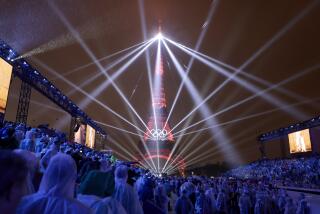Chinese, glued to TV, take pride in their prime time
- Share via
BEIJING — They might not have tickets to the Games. They might never set foot in a stadium. But wherever there was a TV screen, big or small, the people of Beijing on Friday gathered and cheered, soaking up this brief moment in the long history of this ancient capital when the Olympic flame illuminated the Chinese sky.
Despite suffocating heat and the threat of a summer shower, locals poured into designated parks and viewing areas, grandparents and babies in tow, some waiting hours for a foothold among the standing-room-only crowds of thousands that roared past midnight.
“I am so proud to be Chinese tonight,” said Ju Ke, a 19-year-old animation student who got a front-row seat on the grass of Ditan Park before two giant monitors.
As the spectacular opening ceremony began and a little girl in a red dress sang a popular tune on the screen in praise of the motherland, tears welled up in Ju’s eyes.
“China has made so much progress in recent years,” she said. “Chinese culture is so amazing. The Olympics are so hard-earned.”
All the years of waiting and sacrifice seemed worth it when the Games finally began at eight minutes past 8:00 on the eighth day of the eight month in the eighth year past the second millennium, a moment seen as auspicious by the Chinese.
“This is such a huge deal for Chinese people,” said Li Shengli, 78, a white-haired grandfather and retired electrician who had passed out eight times in the heat since showing up at the park after lunch to get a spot where he could sit. “I don’t know if I can live long enough to see the next Olympics. So I had to be here, to participate, to show I care.”
“Look at the spirit of these people. Isn’t it exciting!” said Liu Jianhua, 57, a neighbor of Li, as young people around him with red flags painted on their cheeks chanted in unison, “Go, China, go!”
Bus driver Liu Fengyun and his wife, Yang Guixin, traveled by train here 10 days ago from a small town in northeastern Liaoning province. Even though they could not afford tickets to the competitions, they had to be in Beijing to be as close as they could, to bear witness.
“We were both born in 1949,” said Liu, referring to the year the communists took power. “We are the same age as China.”
The Chinese have “probably been preparing for this day since Deng Xiaoping opened up China to the world,” said Nicholas Martelli, a Chinese-language student from Italy who also had waited hours to see the show on the big screen, along with a group of spectators from Spain.
Just outside Ditan Park, a barbecue restaurant was packed with folks who didn’t want to watch the festivities at home or feel left out.
“I’ve been told to stay away from the Bird’s Nest because we are not locals and we have no tickets,” said He Daifu, 37, a migrant worker who sometimes helps tear down old buildings to make way for new construction projects like the ultramodern Bird’s Nest, formally called the National Stadium.
Li said as he shared a beer and roast lamb with a buddy: “I am a peasant by birth. These Games are not for people like me. Good thing there are TVs.”
Outside the park, the streets of Beijing were eerily empty. The government gave people the day off to reduce congestion. Some major thoroughfares were blocked to traffic unrelated to the Games.
Zhang Bin lives in a historic neighborhood in the shadow of the Confucius Temple where many people still reside in crowded courtyards without indoor plumbing. He had wanted to buy fresh fish to cook Friday night for his family as they watched the festivities on TV. But his corner vendor no longer had fresh produce or meat because the delivery trucks, like other old, smog-spewing vehicles, were being denied full access to the roads as officials sought to clean the air for the Games.
But his 60-year-old father, Zhang Ziyan, didn’t think their small troubles were worthy of complaint.
“This is a once-in-a-lifetime event,” he said. “We need the Olympics to be a success. We want everybody in the world to feel our happiness.”
--
More to Read
Go beyond the scoreboard
Get the latest on L.A.'s teams in the daily Sports Report newsletter.
You may occasionally receive promotional content from the Los Angeles Times.






